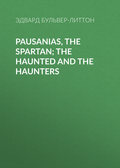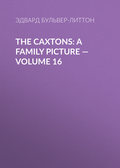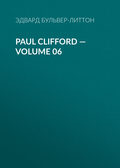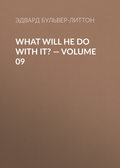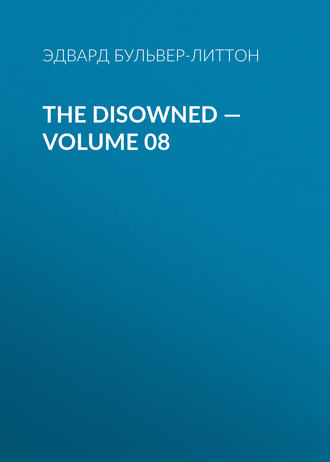
Эдвард Бульвер-Литтон
The Disowned — Volume 08
CHAPTER LXXXV
When laurelled ruffians die, the Heaven and Earth,
And the deep Air give warning. Shall the good
Perish and not a sign?
—ANONYMOUS.
It was the evening after the event recorded in our last chapter: all was hushed and dark in the room where Mordaunt sat alone; the low and falling embers burned dull in the grate, and through the unclosed windows the high stars rode pale and wan in their career. The room, situated at the back of the house, looked over a small garden, where the sickly and hoar shrubs, overshadowed by a few wintry poplars and grim firs, saddened in the dense atmosphere of fog and smoke, which broods over our island city. An air of gloom hung comfortless and chilling over the whole scene externally and within. The room itself was large and old, and its far extremities, mantled as they were with dusk and shadow, impressed upon the mind that involuntary and vague sensation, not altogether unmixed with awe, which the eye, resting upon a view that it can but dimly and confusedly define, so frequently communicates to the heart. There was a strange oppression at Mordaunt's breast with which he in vain endeavoured to contend. Ever and anon, an icy but passing chill, like the shivers of a fever, shot through his veins, and a wild and unearthly and objectless awe stirred through his hair, and his eyes filled with a glassy and cold dew, and sought, as by a self-impulse, the shadowy and unpenetrated places around, which momently grew darker and darker. Little addicted by his peculiar habits to an over-indulgence of the imagination, and still less accustomed to those absolute conquests of the physical frame over the mental, which seem the usual sources of that feeling we call presentiment, Mordaunt rose, and walking to and fro along the room, endeavoured by the exercise to restore to his veins their wonted and healthful circulation. It was past the hour in which his daughter retired to rest: but he was often accustomed to steal up to her chamber, and watch her in her young slumbers; and he felt this night a more than usual desire to perform that office of love; so he left the room and ascended the stairs. It was a large old house that he tenanted. The staircase was broad, and lighted from above by a glass dome; and as he slowly ascended, and the stars gleamed down still and ghastly upon his steps, he fancied—but he knew not why—that there was an omen in their gleam. He entered the young Isabel's chamber: there was a light burning within; he stole to her bed, and putting aside the curtain, felt, as he looked upon her peaceful and pure beauty, a cheering warmth gather round his heart. How lovely is the sleep of childhood! What worlds of sweet, yet not utterly sweet, associations, does it not mingle with the envy of our gaze! What thoughts and hopes and cares and forebodings does it not excite! There lie in that yet ungrieved and unsullied heart what unnumbered sources of emotion! what deep fountains of passion and woe! Alas! whatever be its earlier triumphs, the victim must fall at last! As the hart which the jackals pursue, the moment its race is begun the human prey is foredoomed for destruction, not by the single sorrow, but the thousand cares: it may baffle one race of pursuers, but a new succeeds; as fast as some drop off exhausted, others spring up to renew and to perpetuate the chase; and the fated, though flying victim never escapes but in death. There was a faint smile upon his daughter's lip, as Mordaunt bent down to kiss it; the dark lash rested on the snowy lid—ah, that tears had no well beneath its surface!—- and her breath stole from her rich lips with so regular and calm a motion that, like the "forest leaves," it "seemed stirred with prayer!" [And yet the forest leaves seem stirred with prayer.— BYRON.] One arm lay over the coverlet, the other pillowed her head, in the unrivalled grace of infancy.
Mordaunt stooped once more, for his heart filled as he gazed upon his child, to kiss her cheek again, and to mingle a blessing with the kiss. When he rose, upon that fair smooth face there was one bright and glistening drop; and Isabel stirred in sleep, and, as if suddenly vexed by some painful dream, she sighed deeply as she stirred. It was the last time that the cheek of the young and predestined orphan was ever pressed by a father's kiss or moistened by a father's tear! He left the room silently; no sooner had he left it, than, as if without the precincts of some charmed and preserving circle, the chill and presentiment at his heart returned. There is a feeling which perhaps all have in a momentary hypochondria felt at times: it is a strong and shuddering impression which Coleridge has embodied in his own dark and supernatural verse, that something not of earth is behind us; that if we turned our gaze backward we should behold that which would make the heart as a bolt of ice, and the eye shrivel and parch within its socket. And so intense is the fancy that when we turn, and all is void, from that very void we could shape a spectre, as fearful as the image our terror had foredrawn. Somewhat such feeling had Mordaunt now, as his steps sounded hollow and echoless on the stairs, and the stars filled the air around him with their shadowy and solemn presence. Breaking by a violent effort from a spell of which he felt that a frame somewhat overtasked of late was the real enchanter, he turned once more into the room which he had left to visit Isabel. He had pledged his personal attendance at an important motion in the House of Commons for that night, and some political papers were left upon his table which he had promised to give to one of the members of his party. He entered the room, purposing to stay only a minute; an hour passed before he left it: and his servant afterwards observed that, on giving him some orders as he passed through the hall to the carriage, his cheek was as white as marble, and that his step, usually so haughty and firm, reeled and trembled like a fainting man's. Dark and inexplicable Fate! weaver of wild contrasts, demon of this hoary and old world, that movest through it, as a spirit moveth over the waters, filling the depths of things with a solemn mystery and an everlasting change! Thou sweepest over our graves, and Joy is born from the ashes: thou sweepest over Joy, and lo, it is a grave! Engine and tool of the Almighty, whose years cannot fade, thou changest the earth as a garment, and as a vesture it is changed; thou makest it one vast sepulchre and womb united, swallowing and creating life! and reproducing, over and over, from age to age, from the birth of creation to the creation's doom, the same dust and atoms which were our fathers, and which are the sole heirlooms that through countless generations they bequeath and perpetuate to their sons.
CHAPTER LXXXVI
Methinks, before the issue of our fate,
A spirit moves within us, and impels
The passion of a prophet to our lips.
—ANONYMOUS.O vitae Philosophia dux, virtutis indagatrix!-CICERO.
["O Philosophy, conductress of life, searcher after virtue!"]
Upon leaving the House of Commons, Mordaunt was accosted by Lord Ulswater, who had just taken his seat in the Upper House. Whatever abstraction or whatever weakness Mordaunt might have manifested before he had left his home, he had now entirely conquered both; and it was with his usual collected address that he replied to Lord Ulswater's salutations, and congratulated him on his change of name and accession of honours.
It was a night of uncommon calm and beauty; and, although the moon was not visible, the frosty and clear sky, "clad in the lustre of its thousand stars," [Marlowe] seemed scarcely to mourn either the hallowing light or the breathing poesy of her presence; and when Lord Ulswater proposed that Mordaunt should dismiss his carriage, and that they should walk home, Algernon consented not unwillingly to the proposal. He felt, indeed, an unwonted relief in companionship; and the still air and the deep heavens seemed to woo him from more unwelcome thoughts, as with a softening and a sister's love.
"Let us, before we return home," said Lord Ulswater, "stroll for a few moments towards the bridge: I love looking at the river on a night like this"
Whoever inquires into human circumstances will be struck to find how invariably a latent current of fatality appears to pervade them. It is the turn of the atom in the scale which makes our safety or our peril, our glory or our shame, raises us to the throne or sinks us to the grave. A secret voice at Mordaunt's heart prompted him to dissent from this proposal, trifling as it seemed and welcome as it was to his present and peculiar mood: he resisted the voice,—the moment passed away, and the last seal was set upon his doom; they moved onward towards the bridge. At first both were silent, for Lord Ulswater used the ordinary privilege of a lover and was absent and absorbed, and his companion was never the first to break a taciturnity natural to his habits. At last Lord Ulswater said, "I rejoice that you are now in the sphere of action most likely to display your talents: you have not spoken yet, I think; indeed, there has been no fitting opportunity, but you will soon, I trust."
"I know not," said Mordaunt, with a melancholy smile, "whether you judge rightly in thinking the sphere of political exertion the one most calculated for me; but I feel at my heart a foreboding that my planet is not fated to shine in any earthly sphere. Sorrow and misfortune have dimmed it in its birth, and now it is waning towards its decline."
"Its decline!" repeated his companion, "no, rather its meridian. You are in the vigor of your years, the noon of your prosperity, the height of your intellect and knowledge; you require only an effort to add to these blessings the most lasting of all,—Fame!"
"Well," said Mordaunt, and a momentary light flashed over his countenance, "the effort will be made. I do not pretend not to have felt ambition. No man should make it his boast, for it often gives to our frail and earth-bound virtue both its weapon and its wings; but when the soil is exhausted its produce fails; and when we have forced our hearts to too great an abundance, whether it be of flowers that perish or of grain that endures, the seeds of after hope bring forth but a languid and scanty harvest. My earliest idol was ambition; but then came others, love and knowledge, and afterwards the desire to bless. That desire you may term ambition: but we will suppose them separate passions; for by the latter I would signify the thirst for glory, either in evil or in good; and the former teaches us, though by little and little, to gain its object, no less in secrecy than for applause; and Wisdom, which opens to us a world, vast, but hidden from the crowd, establishes also over that world an arbiter of its own, so that its disciples grow proud, and, communing with their own hearts, care for no louder judgment than the still voice within. It is thus that indifference not to the welfare but to the report of others grows over us; and often, while we are the most ardent in their cause, we are the least anxious for their esteem."
"And yet," said Lord Ulswater, "I have thought the passion for esteem is the best guarantee for deserving it."
"Nor without justice: other passions may supply its place, and produce the same effects; but the love of true glory is the most legitimate agent of extensive good, and you do right to worship and enshrine it. For me it is dead: it Survived—ay, the truth shall out!—poverty, want, disappointment, baffled aspirations,—all, all, but the deadness, the lethargy of regret when no one was left upon this altered earth to animate its efforts, to smile upon its success, then the last spark quivered and died; and—and—but forgive me—on this subject I am not often wont to wander. I would say that ambition is for me no more; not so are its effects: but the hope of serving that race whom I have loved as brothers, but who have never known me,—who, by the exterior" (and here something bitter mingled with his voice), "pass sentence upon the heart; in whose eyes I am only the cold, the wayward, the haughty, the morose,—the hope of serving them is to me, now, a far stronger passion than ambition was heretofore; and whatever for that end the love of fame would have dictated, the love of mankind will teach me still more ardently to perform."
They were now upon the bridge. Pausing, they leaned over, and looked along the scene before them. Dark and hushed, the river flowed sullenly on, save where the reflected stars made a tremulous and broken beam on the black surface of the water, or the lights of the vast City, which lay in shadow on its banks, scattered at capricious intervals a pale but unpiercing wanness rather than lustre along the tide, or save where the stillness was occasionally broken by the faint oar of the boatman or the call of his rude voice, mellowed almost into music by distance and the element.
But behind them, as they leaned, the feet of passengers on the great thoroughfare passed not oft,—but quick; and that sound, the commonest of earth's, made rarer and rarer by the advancing night, contrasted rather than destroyed the quiet of the heaven and the solemnity of the silent stars.
"It is an old but a just comparison," said Mordaunt's companion, "which has likened life to a river such as we now survey, gliding alternately in light or in darkness, in sunshine or in storm, to that great ocean in which all waters meet."
"If," said Algernon, with his usual thoughtful and pensive smile, "we may be allowed to vary that simile, I would, separating the universal and eternal course of Destiny from the fleeting generations of human life, compare the river before us to that course, and not it, but the city scattered on its banks, to the varieties and mutability of life. There (in the latter) crowded together in the great chaos of social union, we herd in the night of ages, flinging the little lustre of our dim lights over the sullen tide which rolls beside us,—seeing the tremulous ray glitter on the surface, only to show us how profound is the gloom which it cannot break, and the depths which it is too faint to pierce. There Crime stalks, and Woe hushes her moan, and Poverty couches, and Wealth riots,—and Death, in all and each, is at his silent work. But the stream of Fate, unconscious of our changes and decay, glides on to its engulfing bourne; and, while it mirrors the faintest smile or the lightest frown of heaven, beholds, without a change upon its surface, the generations of earth perish, and be renewed, along its banks!"
There was a pause; and by an involuntary and natural impulse, they turned from the waves beneath to the heaven which, in its breathing contrast, spread all eloquently, yet hushed, above. They looked upon the living and intense stars, and felt palpably at their hearts that spell—wild, but mute—which nothing on or of earth can inspire; that pining of the imprisoned soul, that longing after the immortality on high, which is perhaps no imaginary type of the immortality ourselves are heirs to.
"It is on such nights as these," said Mordaunt, who first broke the silence, but with a low and soft voice, "that we are tempted to believe that in Plato's divine fancy there is as divine a truth; that 'our souls are indeed of the same essence as the stars,' and that the mysterious yearning, the impatient wish which swells and soars within us to mingle with their glory, is but the instinctive and natural longing to re-unite the divided portion of an immortal spirit, stored in these cells of clay, with the original lustre of the heavenly and burning whole!"



